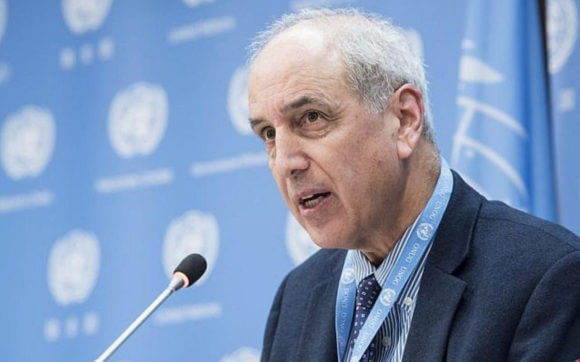For the past 52 days, senior editors at the New York Times have been squirming. The paper’s refusal to write about Amnesty International’s landmark report that found that Israel practices “apartheid” has prompted growing criticism and contempt — not least because Times reporters continue to cite Amnesty’s views about human rights violations in other countries, seven times so far in this month alone.
The Amnesty apartheid finding prompted widespread public debate, including refutations from the Israel lobby, but the Times could not report any of it because it had ignored the original story. Times columnist Bret Stephens, who normally leaps to Israel’s defense, also had to keep quiet.
The Times’s news blackout sparked blistering criticism, from this site and others. Top editors must have realized that the paper needed a way to smuggle mentions of the Amnesty report into print without admitting its journalistic malpractice over nearly 2 entire months. Today, it finally made its move.
Jerusalem bureau chief Patrick Kingsley used another apartheid report, this one by United Nations special rapporteur Michael Lynk, to finally slip Amnesty International into his paper. Kingsley wrote that Lynk, a distinguished Canadian law professor appointed by the U.N.’s Human Rights Council, had “accused Israel of committing the crime of apartheid in the occupied territories.” He quickly summarized Lynk’s finding, gave Israel’s foreign ministry and other critics a chance to respond — and then, right at the end, mentioned briefly that Amnesty, among others, had produced a “similar” report.
Kingsley’s article today is only 13 paragraphs long. It only appeared online, not in the print edition. It did not summarize the Amnesty report, nor include a link to it.
And meanwhile, simultaneously, the paper in a different article cited Amnesty International Australia, once again proving that it considers the human rights organization a valuable source — for everywhere outside of Israel/Palestine.
The Times can now technically deny that it has blacked out the Amnesty International “apartheid” finding. What it can’t plausibly deny is that this site, and others in the global movement for human rights in Israel/Palestine, have finally shamed it into action, even if today’s correction is grudging and half-hearted.



Sheesh! I’ve heard about “burying the lead” but damn, NYT! This like burying the lead, exhuming the body ten years later to slip the ring from the corpse’s bony finger, and then burying the lead all over again! *Slow Clap*
2 of 2 (Excerpt)
“But they built them illegally.”
‘That’s because you won’t let them build legally.’
“’They receive foreign funding to build, from Europe,’ said Nir. ‘Can my daughter get up one morning and just build like that? Can you? You would love to be able to build like that.’
“A month after the demolition, an Israeli soldier shot & gravely wounded Farisa’s 26-year-old son, Harun, in the neck; soldiers had come to their home to confiscate a generator he had been using to rebuild the demolished homes.
“’Do you remember that incident?’ I asked him. ‘Yes, I do,’ he responded, as his expression hardened. ‘It was an unintentional discharge, from what I can recall.’
“‘Putting aside my bewilderment at his reply, I said: ‘Before you go, just know this: I was there [in al-Rakiz] yesterday. They live in a cave. Farisa & her son Harun. He has been paralyzed since the shooting. He cannot move his body. Right now he’s on a mattress in that cave. They don’t have a home anymore, since you demolished it. His mother bathes him with a bucket, because they have no running water. She washes off his pus with a hose. It requires three people to carry him out of the cave. His mother has no ability to build a wheelchair accessible house because you’ll demolish that too.’
“Nir was getting angry. ‘Tell me, what do you think? That we’re heartless? We can’t sleep the night before the demolitions.’ He was silent for a few moments, before adding: ‘I choose to do this. To enforce the law — and the law is fair.’ “On my way back to the court, I saw Mohammed. His family had already built a tin shack where their home used to be in al-Fakheit. Nir, or one of his colleagues in the Civil Administration, will certainly demolish that as well.“’I didn’t understand a word,’ Mohammed replied. ‘Everything was in Hebrew.’ “It hit me that they had sat there, dozens of Palestinians, listening to a judge politely discuss their potential expulsion in a foreign language. I felt guilty for speaking with Nir, as if I werebetraying the families. I am also part of this Jewish-Israeli tapestry — journalist, lawyer, lawmaker — all of us speaking to one another about them. And, of course, we are the ones who get to decide their fate. “…three Jewish-Israeli judges will soon decide whether the army can or cannot expel 1,300 Palestinians from their homes. That is why we need to end the occupation.”
I’d written earlier that the NYT would not mention the Amnesty report until after Russia invaded Ukraine when it would be able to slip in a word or two un-noticed in all the media coverage about the war. I wish I had been wrong about that: I wish they had shown the courage to cover it day one.
Which brings me to the point I want to make now: The NYT did not delay covering the Amnesty report because they wanted to show support for Israel: They did it because they fear organized Zionism. Congress does not support Israel because, as a body, it has some unquenchable devotion to the teachings of Herzl or Nordau: They approve of the billions in annual tribute because they fear organized Zionism. The various state legislatures that have passed anti-BDS laws in violation of foundational American rights, such as the right to boycott not because they suddenly realized that serving Israel was more important than serving their own constituents. They voted to strip Americans of an established Constitutional right because they fear organized Zionism.
Even Jewish institutions such as J Street and The Forward choose their words and hedge their statements not primarily out of a love of Likud, Labor, the IDF or even their enchanted memories of Habonim Dror camp in the mountains and valleys of Palestine: They craft their articles as carefully as they do because they fear organized Zionism.
We oversimplify the case when we misinterpret rank subservience to Zionism as a sign of loyalty, love or support for Israel. Right-thinking writers, editors, columnists and staff at the NYT are all likely in a state of mortification, humiliated by the paper’s abject betrayal of its professional principles. It is likely that at least some of them would love the world to know the truth about what took place in various discussions over the past two months about how to cover the Amnesty report. They all know the paper has taken a blow and that the weak, short and almost insignificant lines it eventually published are not the end of the story. This will haunt the NYT in perpetuity and we should study better the scale and quality of the fear at work to make the “newspaper of record” squander its reputation so needlessly.
See here Palestine posters by/about Amnesty International:
https://www.palestineposterproject.org/publisher/amnesty-international
… meh, just another episode of NYT’s parody of journalistic standards … the real surprise is how such a biased masthead retains any respect whatsoever …
Pedantry alert: the preferred spelling is “lede”, not “lead”. Some say this was meant to distinguish for typesetters the “lead” (long “e”) element of the story from the “lead” (pronounced with a short “e” sound), which was a term used to describe the lines of moveable type used in printing and which were made from lead (the 82nd element in the periodic table).
As with many etymological genealogies, this is as likely to be fanciful as factual. But whatever the reason, “lede” is definitely the preferred form.
And sorry…I can’t help myself.